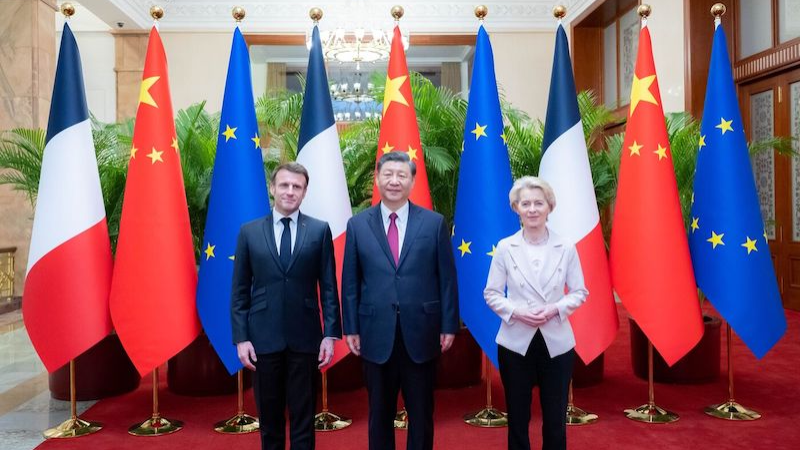
The Xi-Macron Summit’s Unexpected Payoff
There was no breakthrough on Russia and Ukraine, but the Western alliance stayed strong.
By Fletcher Dean Emeritus James Stavridis, former supreme allied commander of NATO
The most important diplomatic encounter in quite a while — between President Emmanuel Macron of France and China’s president, Xi Jinping — turned out to be far less important than either side had hoped. Fortunately, it doesn’t seem to have led to the sort of damage many in the US had feared.
Last week’s visit was billed as a potential diplomatic breakthrough, in which the charismatic Frenchman would charm the Chinese leader into pushing his “no limits” friend, Russian President Vladimir Putin, into peace negotiations over the war in Ukraine. Xi, on the other hand, likely hoped to create division in the Western alliance and build a much stronger bilateral relationship with France. Yet the visit appears to have yielded nothing substantial, and left a number of unanswered questions in its wake.
Most important: What does the summit say about relations between Europe broadly and Beijing?
One aspect of the trip that has received less attention than it should have was the presence of European Commission President Ursula von der Leyen. Macron was given top billing and lavish treatment — including taking tea in Guangzhou in a residence once used by Xi’s father (before his dramatic fall from power during the cultural revolution). Von der Leyen was given a low-key greeting at the Beijing airport and left out from some of the functions where Macron was very clearly the headliner.
Attempting to diminish von der Leyen was a mistake by the Chinese leader. I know her well from her days as Germany’s minister of defense following my time as supreme allied commander of the North Atlantic Treaty Organization. We have remained in touch over the past decade, and her work both in former Chancellor Angela Merkel’s cabinet and now with the EU is noteworthy. She is tenacious, thoughtful, strategically savvy and a leading candidate to become the first woman to helm NATO.
Xi was no doubt annoyed by some of her pre-trip comments describing China as a repressive actor on the international scene, and her hardline views about China’s threat to Taiwan. “How China continues to interact with Putin’s war will be a determining factor for EU-China relations going forward,” she warned, and let’s hope she’s right. Little wonder Xi pushed her out of the spotlight.
Macron’s stated goal was to advance a diplomatic path forward in the Ukrainian war, and he encouraged Xi to discuss the situation directly with President Volodymyr Zelenskiy of Ukraine.
The French leader probably had greater success in gaining some trade advantages for his nation. Dozens of French businessmen flew in his 50-person entourage. Macron was at pains to denounce “decoupling”: The code for the US and China pulling apart economically and heading into a cold-war economic posture. Beijing views decoupling as step one on the road to a Western containment strategy to stymie Chinese growth and power.
The French president had less luck in obtaining any significant environmental concessions from China, which is the globe’s largest user of coal and wood for energy.
On the Chinese side of the diplomatic firing line, Xi’s strategy was an attempt to peel France away from the broader transatlantic alliance position on the war in Ukraine; reduce European support for Taiwan; blunt calls for human rights reform regarding Muslim Chinese Uyghurs and Hong Kong; and undermine US attempts to isolate China economically or in cyberspace. The efforts with France come as Chinese diplomacy is enjoying a rising tide, notably in creating a sudden détente between Iran and Saudi Arabia.
A week later, it appears that neither side achieved its goals. Looking at the final joint statement, China is clearly unwilling to take a leading role forging peace in Ukraine. At best, Macron may have received private guarantees that China wouldn’t make major arms shipments to Moscow. China will continue to hedge its bets through tacit support of Moscow, and get highly discounted oil and gas in the process.
The most important issue for both sides is frankly bigger than France — it is the overall European role in global security structures and the international trade regime. As Henry Kissinger remarked in frustration, you can’t pick up the phone and call “Europe.”
But the Europeans are pulling closer together, especially after the UK chose to exit the European Union. That is good news for the US. The Europeans are vastly stronger joined together, and collectively rival China in terms of GDP and defense spending.
Washington had little faith that Macron would be able to convince Xi to move away from Moscow, but was holding its breath hoping the visit didn’t damage the real center of gravity in the Ukrainian war: Western unity and transatlantic will. While Macron and von der Leyen didn’t move China closer to the European position on Ukraine, their unified front on longer-term geopolitics will serve the West well.
(This post was republished from Bloomberg Opinion.)
